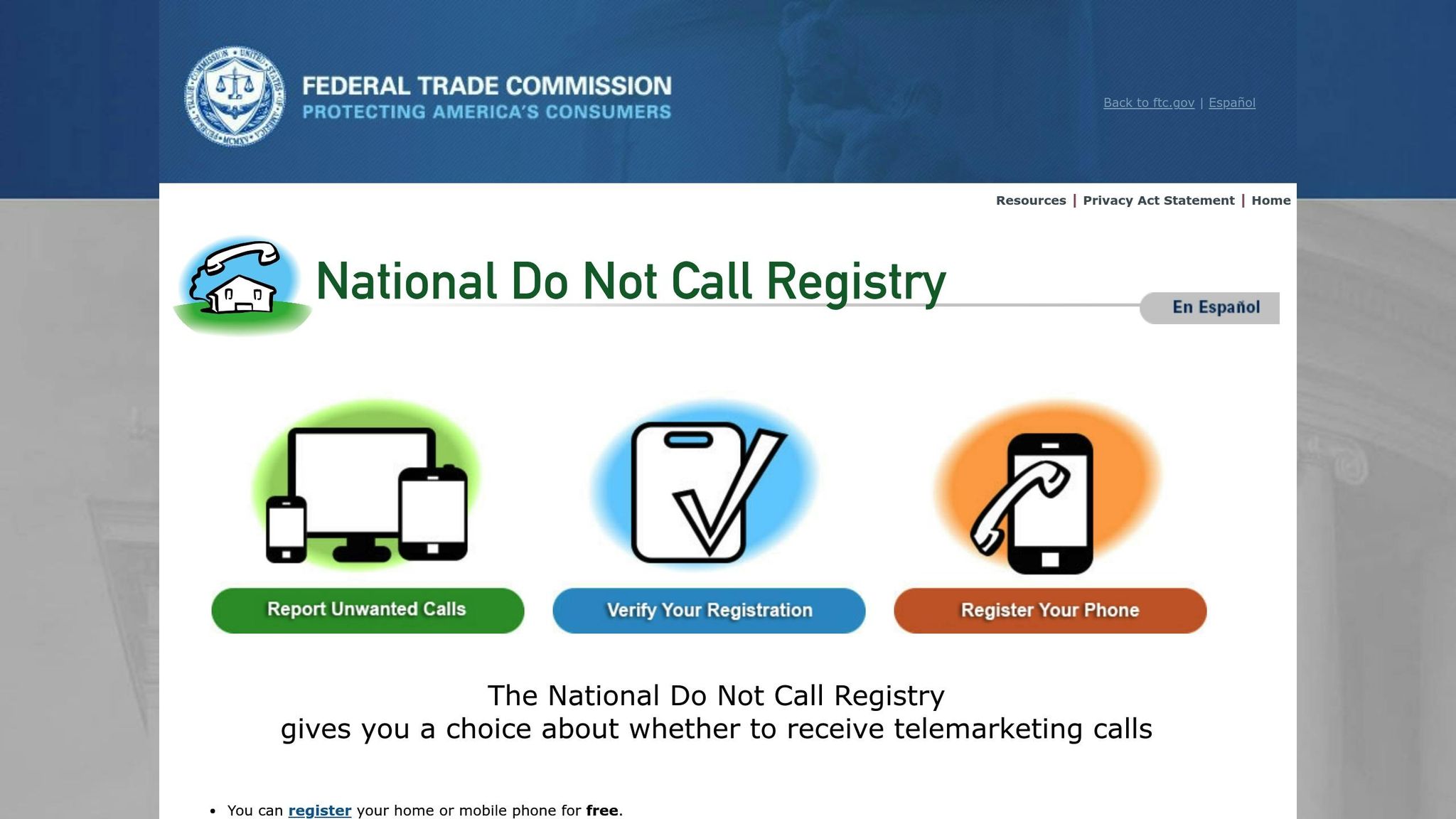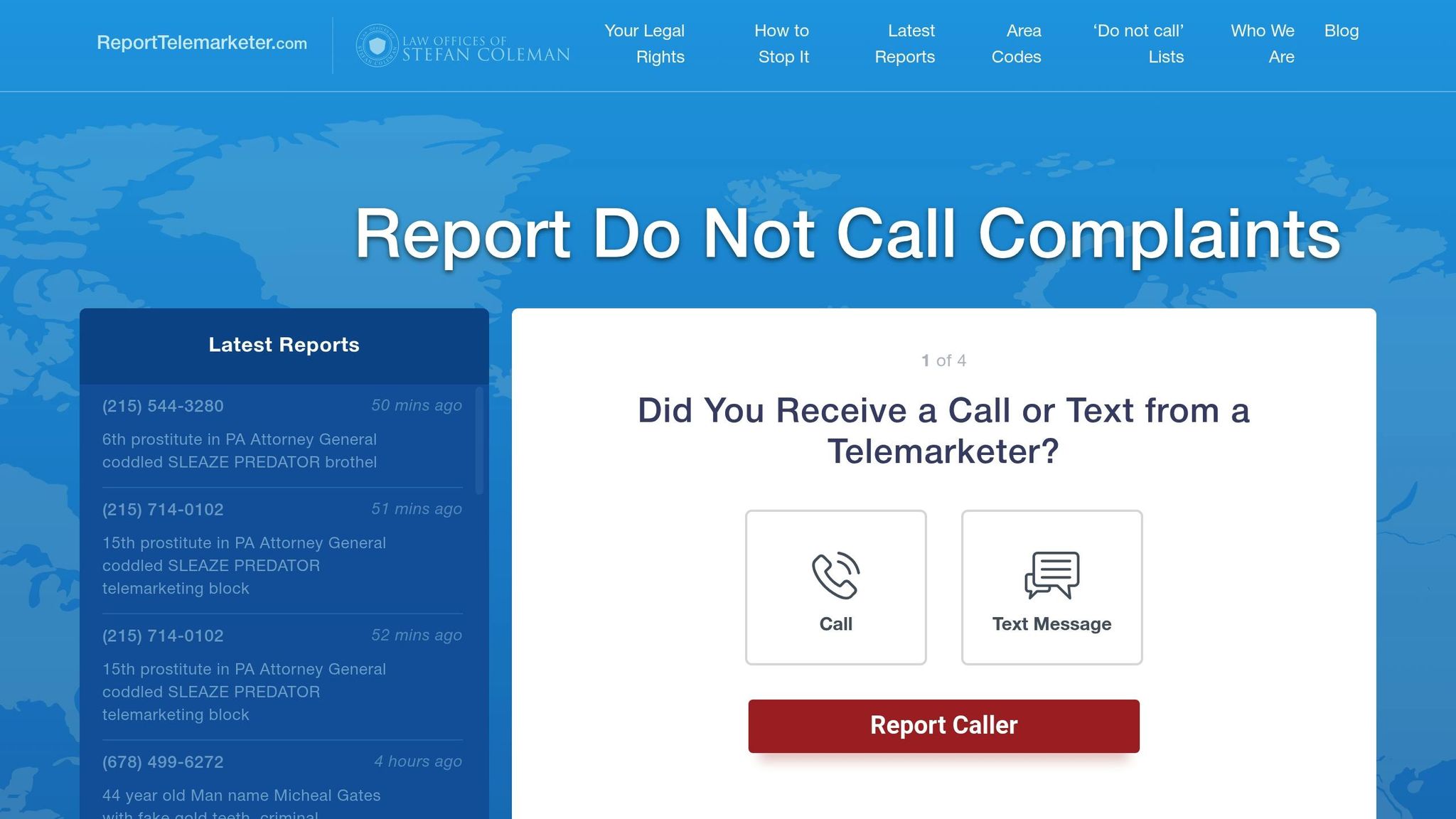
The Telephone Consumer Protection Act (TCPA) is a U.S. law that protects you from unwanted telemarketing calls, texts, and faxes. Here’s how it works:
- Your Rights: You can stop automated calls and texts, claim up to $500 per violation, and take legal action against repeat offenders.
- Common Violations: Calls without consent, improper timing (before 8 AM or after 9 PM), and calls to Do Not Call-listed numbers.
- Action Steps:
- Document violations: Record call details, numbers, and messages.
- Report offenders to the FCC, FTC, or platforms like ReportTelemarketer.com.
- Use tools like call-blocking apps and the National Do Not Call Registry.
These protections empower you to block unwanted calls and hold telemarketers accountable. Want to stop nuisance calls? Start by understanding your rights under the TCPA.
Understanding TCPA for Telemarketing
Spotting TCPA Violations
Understanding how to identify and document TCPA violations is crucial for taking effective action.
Common TCPA Violations
Here are some of the most frequent violations under TCPA law:
- Automated Healthcare Calls: Robocalls promoting healthcare services you didn’t request.
- High-Volume Calling: Receiving multiple calls from different numbers in a single day.
- Timing Issues: Calls placed during early morning hours.
- Deceptive Tactics: Recorded messages claiming charges and asking for callbacks.
- Legal Service Offers: Unwanted calls about auto accidents, often suggesting attorney services.
How to Spot a Violation
Your TCPA rights are designed to protect you from these unlawful actions. Keep an eye out for these red flags:
| Violation Type | Warning Signs |
|---|---|
| Lack of Consent | Calls you never agreed to receive. |
| Improper Timing | Calls made before 8:00 AM or after 9:00 PM. |
| Registry Issues | Calls despite being listed on the Do Not Call list. |
| Harassment | Repeated calls from different numbers. |
Documenting Violations
Tracking every detail of these calls is essential. Here’s what to note:
- Call Details: Record the date, time, and duration of each call.
- Caller Information: Write down the phone number and business name (if available).
- Call Content: Summarize the message or conversation, especially if it was automated.
- Your Response: Include whether you asked them to stop contacting you.
Keeping detailed records is key to building a strong case for reporting violations or pursuing legal action. Accurate documentation strengthens your position and ensures you’re prepared to take the next steps.
sbb-itb-a8d93e1
Stop Unwanted Calls
With detailed call records in hand, you can take concrete steps to put an end to unwanted calls. The TCPA provides both legal and practical ways to tackle persistent telemarketing.
Report to FCC and FTC
You can report violations of the TCPA to the FCC, FTC, or use platforms like ReportTelemarketer.com. These services not only investigate suspicious numbers but also file legal actions against violators when necessary.
National Do Not Call Registry

The National Do Not Call Registry is a key tool to reduce telemarketing calls. Here’s how it works:
- Register your number at donotcall.gov.
- Allow 31 days for the registration to take effect.
- Keep a record of any calls you receive after registration.
Legitimate businesses are required to check this registry and remove listed numbers from their call lists. If you still receive calls after registering, it could indicate a violation of the TCPA.
Legal Actions for Violations
If you experience unauthorized calls, the TCPA allows you to claim up to $500 per call. Specialized legal services can handle the process for you, often with no upfront costs. Attorney fees are typically recovered from the telemarketers if the case is successful. Legal options may include filing complaints, pursuing damages, or joining class action lawsuits.
These strategies combine legal measures with technology to provide strong protection against telemarketing intrusions.
Tools to Block Telemarketers
Digital tools play a key role in helping block and filter unwanted calls, complementing the protections provided by the TCPA. These tools work together to safeguard your communication.
Call Blocking Apps and Services
Most smartphones come with built-in call-blocking features, and carriers offer free call-filtering services to help manage unwanted calls. For example:
- AT&T ActiveArmor blocks fraud calls automatically.
- T-Mobile Scam Shield identifies spam calls.
- Verizon Call Filter screens incoming calls for potential threats.
If you need extra protection, specialized apps can offer advanced features. These apps analyze call patterns and maintain up-to-date databases of telemarketers, providing an additional layer of defense.
Stop Automated Calls
Reducing automated calls requires a combination of strategies, including:
- Activating the Silence Unknown Callers feature in your phone settings.
- Revoking consent for automated calls.
- Using your carrier’s spam filters.
- Setting up voicemail screening to filter unknown numbers.
When paired with reporting platforms, these steps can significantly reduce intrusive telemarketing calls.
ReportTelemarketer.com: Stop Unwanted Calls

ReportTelemarketer.com is a free service designed to combat illegal telemarketing. You can report unwanted calls through their website, where their team will investigate the number, check for TCPA violations, and, if necessary, take legal action. If violations are proven, attorney fees are recovered from the telemarketer.
Their process includes:
- Analyzing the reported phone number in detail.
- Evaluating potential TCPA violations.
- Taking legal action, such as sending cease and desist letters.
- Following up with users if more information is required.
Summary: Using TCPA Protection
The TCPA offers a strong safeguard against unwanted telemarketing calls, empowering consumers to take action when their privacy is violated.
Key Points
The law allows consumers to claim up to $500 per call if telemarketers violate the rules. This makes it an effective tool for holding offenders accountable. Here’s how you can use it:
- Keep detailed records of violations, including call logs and voicemails.
- Report violations through proper channels for further action.
Steps to Take
- Document thoroughly: Save call logs, voicemails, and screenshots as evidence.
- Report offenders: Use platforms like ReportTelemarketer.com to submit details for investigation.
- Get legal help: Consult with professionals if the violations continue.
ReportTelemarketer.com offers a free service to combat unwanted calls. Their team investigates reported numbers and may take further steps, such as issuing cease and desist letters or filing complaints when necessary.
Taking quick and decisive action helps protect your privacy and strengthens your defense under the TCPA.